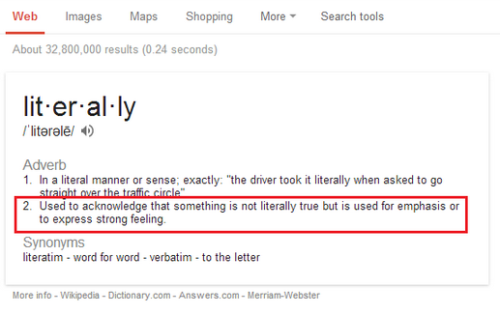fursasaida: priceofliberty: blonde-swanson: pleatedjeans: lit…

literally now means figuratively. Congrats, morons. via
language evolves. don’t be a literal nazi over it op
but what’s the point if the word comes to mean literally the exact opposite of its original definition.
It doesn’t…really…matter? Like, again, language evolves. I don’t really understand asking “what’s the point” about this, because the purpose of all language is to communicate. If a certain set of sounds stops communicating one idea and starts communicating another, then the point is still the same: communication. Let’s take the classic example, “nice.” (This post is not going to be very nice.)
Latin (nescius): “ignorant.”
Old English and Old French: “foolish, stupid”.
16th-century English: “particular, finicky; specific”.
Today: “pleasant, agreeable, respectable”. In my experience, it’s increasingly being used to mean “fancy, upper-class, expensive”: “Their apartment is SUPER nice, holy shit,” “He took me to this really nice restaurant and I felt a little out of place, to be honest.”“Nice” means more or less the opposite of what it meant to begin with. Is anyone confused? Nope! If someone says “I was literally freaking out” vs. “I was literally for real falling asleep in class” are you confused about what they mean in either case? Does body language and intonation count for nothing? (I recognize the latter doesn’t apply online.) Do we really have no alternatives for “literally” in the sense of “exactly,” “actually,” “truthfully,” “per se”? Oh look, four right there!
Want another, more similar example? How about “really”? It means either “truly” or ”very much so, intensely,” just as “literally” does (though I’d argue that “really” is comparative while “literally” is superlative). It originated in religious discourse (“literally” took a stop through there as well), meaning that Christ was present in the Eucharist in a real sense. So ”real” + “ly” is an awful lot like what “literally” has meant and still means some of the time. Nobody’s telling you not to use it the way you’d like to, or that you’re wrong to do so. It just has a second meaning.
That variation may annoy you, but the vast majority of English-speakers do not give a shit that you’re annoyed. The existence of the rule that allows you to say “a SUV” instead of “an SUV” bothers me no end because I think it sounds horrible, but it is technically allowed, in formal writing and therefore, from your perspective privileging existing rules over evolving speech, at any other time as well. From my perspective welcoming evolving language, it’s also valid because it’s very common in speech among people who simply happen speak differently from me. It’s not up to me to tell people not to do it just because I don’t like it or it sounds weird to me. The way I talk is specific to where I’m from and the environment I grew up in, the difference is very much interwoven with race, class, and geography, and my speech is not better or more correct than anybody else’s.
It’s certainly not up to me to call people fucking MORONS because they’re using a word in a way I don’t like, especially when doing so hurts no one—unlike, say, the word “moron.” So fuck you for that one, OP, because it makes you a classist, ableist asshole who cares more about your precious, ossifying definitions than you do human beings.
For that matter, I think there’s a reason that “literally” keeps coming up as a flashpoint of this kind of reactionary anger about language changing, and I think it’s because it’s commonly a feature of young people’s, and especially girls’, speech. The same panic happened over the heavy use of “like,” over abbreviations in instant messaging and texting, over pretty much every feature of Valley Girl speech. God forbid teenage girls’ language spread and have influence on the way we all talk. God forbid the ways in which their speech is distinct from others’ be considered valid and normal.
“Un idioma es un dialecto con armas”: A language is a dialect with weapons. Language is not a dialect with natural superiority; language is the dialect of whoever is in power. This is why our grammar is arbitrarily based on Latin even though English is a Germanic language (don’t even get me started on the ridiculousness of the rules about split infinitives). This is why kids coming from lower classes or non-white ethnicities have to learn to “talk white,” why ebonics is systematically stamped out. This is why the speech of girls and women is policed and treated as some kind of mental or societal cancer.
The fact that the word “literally” exists at all is fundamentally arbitrary, because language is fundamentally arbitrary. “Literal,” if we want to go back in time, just means “of or relating to letters,” which has nothing to do with either meaning today.
The changing of the definition of “literally” is literally not a problem. It’s what’s behind the objections that I’m literally soooo mad about, oh my god.
Love,
A copy editor.
Hm. I may have been literally schooled.
Reposted from http://lies.tumblr.com/post/62716521835.
